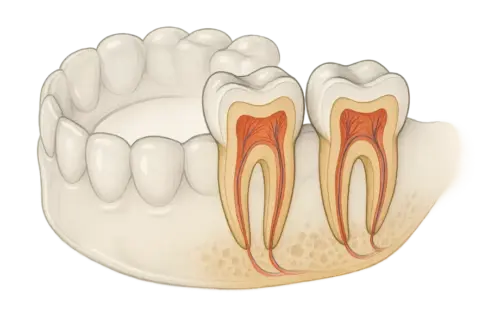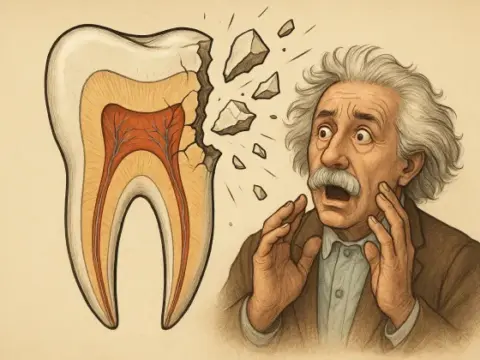1Does a root canal tooth change color over time?
The tooth that has undergone root canal treatment may change color over time. This is due to the loss of vitality of the tooth and the tissue residues inside it can cause discoloration. To solve this problem, your dentist can offer an aesthetic solution with methods such as internal bleaching or veneers. Regular dental check-ups after root canal treatment are important to prevent such aesthetic problems.
2How long does tooth sensitivity last after root canal treatment?
There may be mild tooth sensitivity after root canal treatment, which usually subsides within a few days to a week. Sensitivity is caused by the procedures performed on the tooth roots during treatment and is a temporary condition. After treatment, using painkillers recommended by the dentist and avoiding hard foods can help reduce sensitivity.
3Is there a risk of tooth fracture after root canal treatment?
Since the tooth that has undergone root canal treatment may be structurally weakened, the risk of fracture increases. For this reason, it is recommended to support the tooth with a crown or filling after root canal treatment. This risk is especially higher in molars. Appropriate restoration after treatment increases the durability of the tooth and ensures a long life.
4Why is a crown recommended for root canal treated teeth?
Teeth that have undergone root canal treatment can become brittle due to the removal of the nerve tissue they contain. A veneer is a restoration to protect this tooth and strengthen it against external factors. Especially in the back teeth, veneers are recommended due to the high chewing forces. This prevents the tooth from breaking and keeps it healthy in the mouth for a long time.
5Does the infection recur after root canal treatment?
In rare cases, infection may recur after root canal treatment. This may be due to incomplete cleaning of the canal, the development of a new infection or extra canals that were not detected during treatment. In this case, the root canal treatment can be repeated (revision). The dentist will take the necessary steps to prevent the infection from spreading and to protect the treated tooth.
6Is there swelling after root canal treatment?
Slight swelling may occur around the tooth after root canal treatment. This is the body's reaction to the infection and usually resolves spontaneously within a few days. In case of swelling, cold compresses can be applied and antibiotics prescribed by the physician can be used. If the swelling does not decrease or increases within a few days, it is important to contact your dentist.
7Why does a root canal tooth hurt?
A tooth that has undergone root canal treatment may show short-term pain or sensitivity after treatment. This depends on the pressure applied to the tooth root during the procedure and the response of the tissues. If the pain does not go away or intensifies within a few weeks, the tooth may have developed a re-infection. In this case, you may need to discuss an additional treatment plan with your dentist.
8Can root canal treatment be performed on children?
Yes, root canal treatment can also be performed on children. In cases of major decay or infection in deciduous teeth in children, root canal treatment can be performed to prolong the time these teeth remain in the mouth. Primary teeth act as placeholders for the permanent teeth to erupt properly. It is therefore important to preserve decayed or infected teeth as much as possible.
9How should teeth be cared for after root canal treatment?
Teeth that have undergone root canal treatment do not require any different care than other teeth. Regular brushing and flossing will help you maintain the health of your teeth. It is also important not to neglect the periodic check-ups recommended by your dentist. The filling or crown on the tooth that has undergone root canal treatment can remain healthy in the mouth for a long time with regular care and checks.
10Are the materials used during root canal treatment safe?
The biocompatible materials used during root canal treatment have been specially developed to protect dental health and are safe. These materials fill the inside of the tooth and prevent re-infection. The materials minimize the risk of allergic reactions and help the tooth to stay in the mouth for a long time. Therefore, one should not worry about the safety of the materials used during root canal treatment.
11Is root canal treatment a painful treatment?
Since root canal treatment is a treatment performed under local anesthesia, no pain is felt during the procedure. The feeling of numbness passes after 2-3 hours in our patients. After the treatment, mild pain may be felt on the same day, sometimes the next day. There is no harm in taking painkillers when there is pain.
12How long does root canal treatme
The duration of root canal treatment varies depending on the infection, number of canals and location of the tooth. Generally, it takes 2 sessions because the tooth is infected. In caries-free teeth, the treatment can be completed in one session. In the first session, the canals are thoroughly cleaned and medicated. In the 2nd session, if there is no infection, filling is done.
13What should be considered during and after the treatment?
Since the tooth is dead during root canal treatment, it is very susceptible to breakage, hard foods should not be consumed and that tooth should not be used a lot. Antibiotic support is provided depending on the infection. After the treatment is over, it is waited for 2 weeks without permanent filling, then permanent filling is done. Eating and drinking should be done after the effect of local anesthesia wears off. After the permanent filling is made, regular 6-month controls should be made and if there is loss of material in the fillings, the canal treated tooth should be supported by coating.
14How many canals do teeth have?
The number of canals in the teeth varies according to the location of the tooth and the person. The number of canals of the teeth in the anterior regions is 1, small teeth have 2 canals, and large teeth have 3 or 4 canals.
15Can root canal treatment be performed again?
Root canal treatment can be performed 2-3 times for one tooth by our specialists. The old filling is cleaned, medication is applied and redone.
16How long can the root canal treated tooth be used in the mouth?
As long as the person pays attention to oral hygiene and care, it can be used in the mouth for a lifetime.




